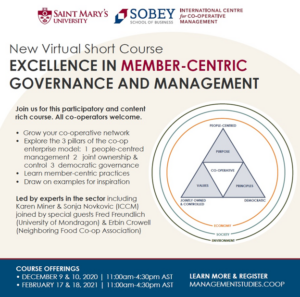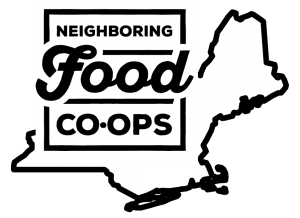 Your Neighboring Food Co-ops
Your Neighboring Food Co-ops
Locally Owned by More Than
150,000 People Like You!
In this Month’s E-News, check out:
- Giving Thanks & Caring for Community
- Go Co-op for the Holidays
- Short Course in Co-op Governance and Management
- November’s Cave to Co-op Special
- Farm to Freezer For the Holidays
- Farmers Union: Farmers Receive 11.9 Cents of Thanksgiving Dollar
- Co-op Calendar
Giving Thanks & Caring for Community
As we give thanks this holiday season, we especially appreciate our food co-op staff that are working hard to keep our communities safe while ensuring access to healthy, nourishing food.
However you choose to celebrate the season, this year will be different. As we gather in smaller 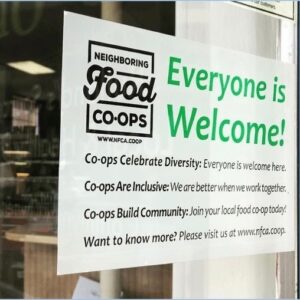 groups and work together to slow the spread of COVD-19, we can also look forward and consider how co-operation can help us rebuild our communities.
groups and work together to slow the spread of COVD-19, we can also look forward and consider how co-operation can help us rebuild our communities.
When you shop at your local food co-op this holiday season, you’re getting more than healthy, delicious food and gifts for yourself and your family. You are also helping to…
- Strengthen Local Economies. When you shop at the co-op, more of your money stays in the community, supporting local producers, and building shared wealth. On average, local products account for 30% of sales at our member food co-ops (compared to 2% in supermarkets). Last year, our customers purchased over $93 million in products from local producers, helping to build local economies.
- Support Good Jobs. On average, food co-op staff receive higher wages and more are employed full-time than in supermarkets in our region. Over 60% of our 2,300 co-op employees are also members, sharing in the ownership of their community grocery store.
- Build Sustainability. Your purchases support sustainable agriculture, Fair Trade, reduced packaging through bulk buying, renewable energy and increased efficiency — contributing to a more healthy environment.
- Grow a More Inclusive Economy. Food co-ops are locally owned and democratically governed by their members — more than 150,000 people like you who live and work in our communities — empowering people to work together to build an economy that works for everyone.
At NCBA CLUSA’s IMPACT conference in October, Dr. Jessica Gordon Nembhard shared her vision for the co-op movement in helping our communities rebuild: “The next system that I think we need, and that I think hopefully we’re moving toward, would be what I call a co-operative commonwealth and a solidarity economy. By a ‘cooperative commonwealth’ I mean a system of interlocking co-operative ownership structures in all industries and all sectors of the economy, where co-ops supply each other and feed into each other and fund each other.”
Control of our food system matters, and working together our co-ops are already building this system. Based on the values of self-help, self-responsibility, democracy, equality, equity and solidarity, co-operatives offer a different approach to business.
All are welcome to shop at your local food co-op, and we invite you to become a member-owner, joining with your neighbors as we work together to build more healthy, just, and sustainable communities.
To find a food co-op near you, please visit: https://nfca.coop/members
As we celebrate the holidays this year, it’s even more important than ever to give gifts and share special foods that help build a more healthy, just, and sustainable food system and a stronger local economy!
Choosing your local food co-op for their offerings. There are many options, including: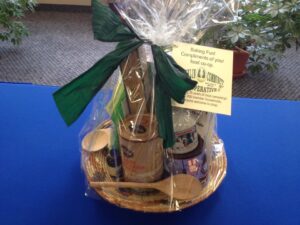
- Special Holiday Foods and Beverages and all of the ingredients you need for holiday celebrations like artisan and regional special cheeses for creating the perfect cheese platter.
- Make your own gift basket filled with Locally Made items or Personalized Themes for everyone on your list like these suggestions from GreenStar Food Co-op’s Gift Guide or health themed from Franklin Community Co-op.
- Food as gifts, learn to make special foods to give as gifts. Check out your co-op’s cooking classes like Co-op Food Stores offerings.
- Can’t decide what to get your loved ones? Give the gift of co-operation with a co-op gift card or a membership in your local food co-op or start-up. Great for mailing too!
However you choose to celebrate this season, you can find all of the ingredients you need for to bring joy to friends and family, whether near or far — and a more inclusive and sustainable community — at the co-op!
Short Course in Co-op Governance and Management
Executive Education training addresses unique opportunities inherent in leading and managing co-operatives while placing members at the core of business success.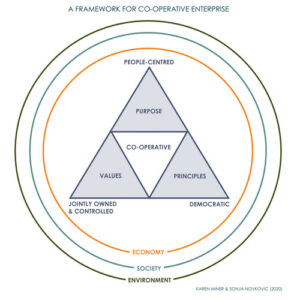
Join your Neighboring Food Co-ops for an engaging online course on Excellence in Member-centric Governance and Management, offered by the International Centre for Co-operative Management at Saint Mary’s University. Designed for seasoned decision-makers and emerging leaders from any sector or type of co-operative, all will benefit from this knowledge-rich, two-day course.
Learn more and register now for upcoming sessions:
- DEC 9 & 10, 2020 // 10:00am-3:30pm EST
- FEB 17 & 18, 2021 // 10:00am- 3:30pm EST
This virtual short course is designed for long-standing and emerging leaders in the co-operative economy, across all sectors and membership types. In this course, participants will:
- Challenge and broaden their paradigm through discussions of the co-operative enterprise model.
- Think deeply about their members and how to operationalize their rights and responsibilities as users, owners, controllers, and beneficiaries of the organization.
- Identify the practices that lead to member-centric governance and management.
- Draw inspiration from other co-operatives and co-operators.
“The Saint Mary’s Two Day Executive Course on Member-Centric Management was such an enlightening experience,” said Tim Wingate, CFO & Finance Manager at Hunger Mountain Co-op in Montpelier, VT, who participated in a training in October. “From the pre-course readings and case studies to several models, this session really helped to broaden my perspective of what it truly means to member-focused.”
Join us for this educational experience including presentations and discussions led by co-operative educators including:
- Karen Miner, Managing Director, and Sonja Novkovic, Academic Director of the International Centre for Co-operative Management (ICCM), Saint Mary’s University
- Key presentations by Fred Freundlich (LANKI, University of Mondragón, Spain) and Erbin Crowell (Neighboring Food Co-op Association and NCBA-CLUSA Board Chair, USA)
- Featured speakers providing case studies and examples.
“Members are at the heart of the co-operative difference and our competitive advantage,” said Erbin Crowell, executive director of the Neighboring Food Co-op Association and a presenter for the course. “These sessions offer a unique opportunity for co-op leaders to explore how a member-centric approach is essential to business success.”
Course content is focused on enhancing your knowledge and building your network. Discuss and debate the many facets of the membership aspect of co-operatives, including: people-centered management, joint ownership and control, and democratic governance. Grapple with the unique challenges inherent in leading and managing co-operatives while including voice, representation, participation, and engagement of people at the core.
Get more info and register:
https://www.smu.ca/academics/sobey/member-centric-governance-management.html
November’s Cave to Co-op Special
Shelburne Smoked Cheddar, Shelburne Farms, Shelburne, VT
Shelburne Smoked Cheddar has a memorable, earthy flavor, golden color, and a dense, flaky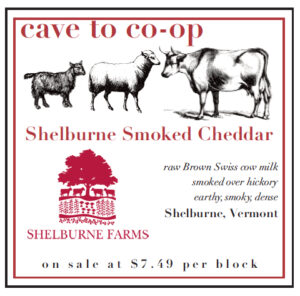 texture that is a bit drier and more crumbly than that of its younger counterpart. The 6-8 hours of cold smoking with hickory gives the cheese a smoky almost bacon-like flavor. It features a wonderful interplay of sharpness and sweet notes.
texture that is a bit drier and more crumbly than that of its younger counterpart. The 6-8 hours of cold smoking with hickory gives the cheese a smoky almost bacon-like flavor. It features a wonderful interplay of sharpness and sweet notes.
One cannot speak of the agricultural history of Vermont without speaking of Shelburne Farms. In 1886, William Seward and Lila Vanderbilt Webb began their plan for Shelburne Farms, a model farm built to demonstrate innovative agricultural techniques and to develop a breeding program for an “elegant workhorse.” It took 6 years and over 300 workers, but by1902 the property had grown to encompass 3,800 acres and four impressive buildings. In its day, Shelburne Farms was one of the foremost agricultural estates in the country. But the cost of maintaining a venture on such a huge scale was prohibitive and the family struggled to hold on to the property until the mid 1970s, when the farm was incorporated as a nonprofit entity dedicated to conservation and education programs.
In the 1950s, the farm acquired a herd of Brown Swiss cows. When Vermont agriculture laws prohibited the sale of raw milk, the farm began making cheese and today Shelburne Farms cheddar is prized throughout the world and considered to be one of the great cheddars produced in America.
Shelburne Farms’ agricultural operations provide real life processes and learning opportunities that directly support their educational mission to cultivate a conservation ethic. Through sustainable land use and practices they continuously seek to improve the health of the soil and the economic and ecological vitality of the Vermont community.
All the milking cows in the purebred herd of Brown Swiss are raised on the farm and graze on pasture from spring to fall. Only their milk – absolutely fresh and untreated and rbST/rbGH free – is used to make the cheese. The only other cheese ingredients the cheese makers use are starter culture, rennet and salt.
Each month, our Cave to Co-op partnership between Provisions International and the Neighboring Food Co-op Association (NFCA) offers a delicious regional cheese featured at a great price. Strengthening our local and regional farmers and producers by supporting artisanal cheesemakers is a key element of the Cave to Co-op program. For recipes and more information about Shelburne Farms Cheddar see the November Cave to Co-op page
Farm to Freezer for the Holidays
Holiday gatherings might look a little different this year, but creating special dishes highlighting local foods can remind us of the future we are building, together.
Your local food co-op works hard to support local producers. And by working together, the 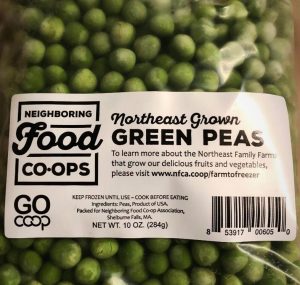 members of the Neighboring Food Co-op Association, are increasing our impact as we grow the regional food system.
members of the Neighboring Food Co-op Association, are increasing our impact as we grow the regional food system.
Recognizing that most frozen fruits and vegetables on our shelves come from far away, the NFCA launched ‘Farm to Freezer,’ an innovative project aiming to help extend the marketing season for family farmers in the Northeast and increase the availability of healthy, sustainably grown, regionally sourced fruits and vegetables for our members and shoppers. Now in it’s fifth year the project moves nearly three tons a year of Blueberries, Green Peas, and Non-Gmo Corn from regional farmers to our regional processor, from our co-ops freezers to consumer’s table. Our member food co-ops purchase an estimated $93.5 million in local products annually. NFCA frozen fruits and vegetables have become a regular contributor to that total and enable access to more local produce all year round.
Now more than ever demonstrating what food co-ops can accomplish to bolster our regional food system by using our shared strength is needed. Your co-op has the ingredients you need for making your holiday meals special and when you choose local ingredients, you can keep family farmers thriving, strengthening our regional food system and have quality ingredients for your special meal.
Holiday gatherings might look a little different this year, but creating special dishes highlighting local foods can still be a focal point. Try this HomeStyle Creamed Corn recipe using NFCA Frozen Corn for a special side dish.
The NFCA’s Northeast Grown Frozen Fruits & Vegetables are easy to find in the freezer section — they’re packed with a simple black and white label in a clear package so you can see what’s inside. For more information, please visit www.nfca.coop/farmtofreezer or stop in at your local food co-op: www.nfca.coop/members.
Farmers Union: Farmers Receive 11.9 Cents of Thanksgiving Dollar
For every dollar Americans spend on their Thanksgiving dinner this year, farmers and ranchers will earn approximately 11.9 cents, according to National Farmers Union (NFU).
This marks a slight decline from 2019, when farmers claimed 12.15 cents of the Thanksgiving 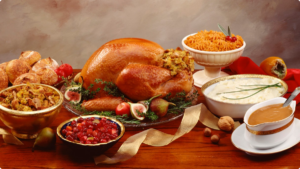 food dollar.
food dollar.
Though farmers’ increasingly small share of food expenditures could be blamed on dropping commodity prices in years past, that isn’t the case this Thanksgiving; after cratering during the pandemic, prices for many agricultural products have mostly recovered. Instead, the shift can be attributed to higher grocery bills. In the last 12 months, food prices have risen nearly 4 percent, far outpacing the 1.4 percent rate of overall inflation.
The rise in food prices couldn’t come at a worse time for American families, who are experiencing elevated rates of unemployment and food insecurity as a result of the covid-19 pandemic. “Ordinarily, Thanksgiving is a time to gather with our loved ones and enjoy a big meal,” said NFU President Rob Larew. “But for many Americans, the typical, food-filled get-together won’t be possible, and not just because of public health concerns. With millions out of work and no additional government support in sight, the cost of traditional holiday foods may simply be out of reach for some families.”
Here in Northeast, food co-ops have been working to cushion the blow of increased food insecurity through Healthy Food Access programs that make groceries and co-op membership more accessible to families on limited incomes, donating local food pantries, and working with partners such as the New England Farmers Union to advocate for relief for people impacted by COVID-19.
Since the beginning of the pandemic, NFU has been pushing legislators to expand the nutrition safety net in order to offset an abrupt rise in food insecurity. Congress took some steps to do so with the passage of the Coronavirus Aid, Relief, and Economic Security (CARES) Act in March, which added $15.5 billion to the Supplemental Nutrition Assistance Program (SNAP) in order to accommodate more participants and facilitated the redistribution of surplus food from farmers to food banks. In the subsequent eight months, however, most of the CARES Act funding has been spent, and there has been little progress towards securing additional support for nutrition assistance programs.
“As cases continue to rise across the country and safety measures are put in place, it’s clear that we have a long ways to go with economic recovery,” said Larew. “In the meantime, it is a moral imperative that we ensure every single American has access to the food they need. By far the most cost-effective and efficient way legislators can achieve that is by expanding SNAP benefits.”
Even though consumers are paying 4 percent more for food, almost none of that is being passed on to farmers and ranchers. Instead, it’s being captured by the processors, packers, distributors, and retailers in between. Nowhere has this been more evident than the meat sector; retail beef prices have increased more than 10 percent over the last 12 months, but ranchers are earning essentially the same amount for cattle as they were a year ago.
The disparity is largely due to the overwhelming market power held by the largest beef packers, Larew indicated. “Lax antitrust enforcement has allowed just four corporations to take over 85 percent of beef slaughtering and packing in the United States. As a result, those companies are able to manipulate farmers’ and consumers’ prices to their advantage – and, as we’ve seen again and again, they do just that,” he said. “The key to ensuring farmers a fair price isn’t charging consumers astronomical prices – it’s breaking up these companies and restoring competition to the market.”
The Farmers’ Share is based on calculations derived from the monthly Agriculture Prices report produced by the U.S. Department of Agriculture’s National Agricultural Statistics Service and price points of common grocery food items at Safeway supermarket. The farmer’s share of retail turkey sales is reported by the Contract Poultry Growers Association of the Virginias, as national data on farm prices for turkey does not reflect the amount turkey growers receive.
The Thanksgiving Farmers’ Share can be viewed and downloaded here.
Our Local Farmers & Fishermen Need You!
Do you care about where your food comes from and want to support the people who produce it? Join the NEFU as a Friend of the Farmer for just $15. Your membership will help ensure that our region’s producers and consumers are heard by policy makers here at home and in Washington, DC. For more information, please visit www.newenglandfarmersunion.org.
For More Co-op Events, Visit https://nfca.coop/calendar
The Neighboring Food Co-op Association (NFCA) is a co-operative federation of 40 food co-ops and startup initiatives across New England, working together toward a shared vision of a thriving co-operative economy, rooted in a healthy, just, and sustainable food system and a vibrant community of co-operative enterprise.


